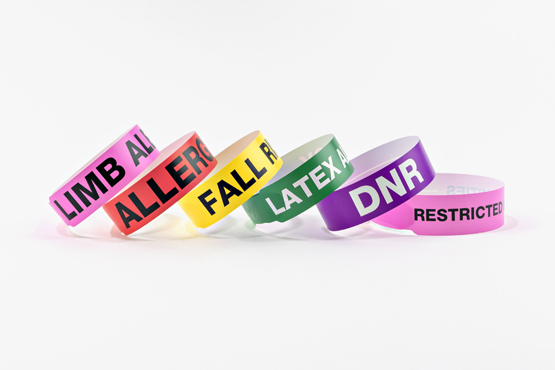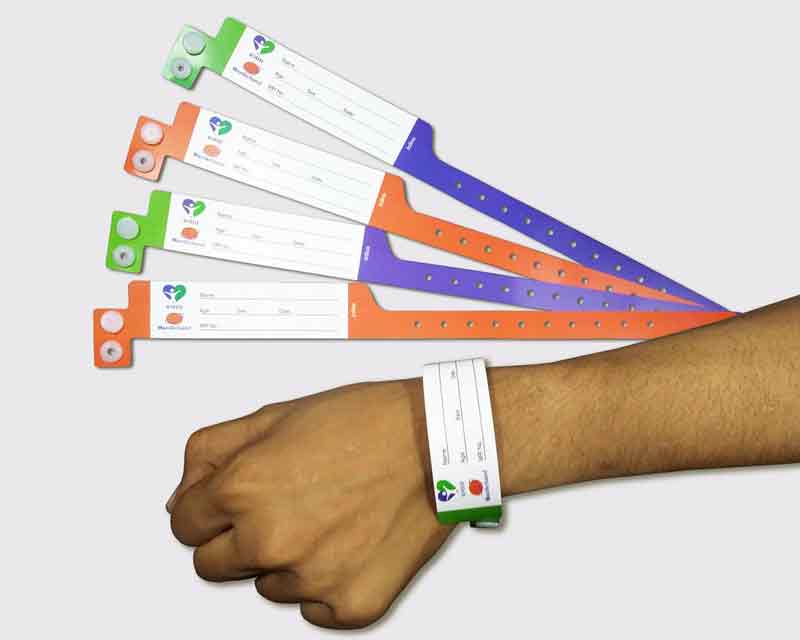Choosing the Right Substances for Your Patient Identification Band: A Step-by-Step Guide
Choosing the Right Substances for Your Patient Identification Band: A Step-by-Step Guide
Blog Article
A Comprehensive Guide to Patient Identification Band as a Vital Medical Supply
In the substantial landscape of health care, Patient Identification bands have actually become an important tool (patient identification band). These bands, teeming with vital information, work as the very first line of protection against clinical mistakes and make sure smooth Patient treatment. As we start to discover these clinical materials detailed, we discover the intricacies of their layout, usage, and influence on Patient safety, while hinting at the promise they hold for future clinical methods
The Role of Patient Identification Bands in Healthcare
The importance of Patient Identification bands in healthcare can not be overstated. These simple wristbands serve as the main technique of guaranteeing Patient identity, minimizing the risk of clinical mistakes and improving total Patient safety and security. Patient Identification bands provide a system of checks and equilibriums, a fail-safe against prospective errors, and a constant pointer of the specific behind the treatment.
Deciphering the Information on Patient Identification Bands
While they might seem simple at a glimpse, Patient Identification bands carry essential information that can significantly affect the training course of an individual's treatment. These bands frequently display the Patient's name, day of birth, and a distinct identifier, such as a clinical document number. Furthermore, the barcode discovered on these bands can be scanned to access the Patient's digital health and wellness document, supplying a riches of info to medical care providers.
Different Sorts Of Patient Identification Bands: A Closer Appearance
In the realm of Patient Identification, there are several kinds of bands that serve unique purposes. Barcode Identification Bands, RFID Tag-based Bands, and Color-Coded Patient Bands are the main categories - patient identification band. Each kind provides unique attributes and benefits, which will be taken a look at in the adhering to sections
Barcode Identification Bands
Providing a considerable enhancement in Patient security, barcode Identification bands have actually become a vital tool in the medical field. These bands shop critical Patient information in a barcode format that's rapidly obtainable with a scan. Significantly, these bands have substantially reduced clinical errors and enhanced Patient safety and security.
RFID Tag-based Bands
One more innovative approach in Patient Identification is the usage of RFID Tag-based bands. These bands make use of Radio Frequency Identification (RFID) technology to give a secure kind of Patient Identification. Regardless of these obstacles, RFID tags offer considerable possibility for enhancing Patient safety and efficiency in healthcare.
Color-Coded Patient Bands
Color-coded Patient bands stand as a simple yet effective device in Patient Identification. These bands, extensive in facilities and health centers, make use of various colors to indicate various Patient allergies, conditions or risks, making certain instant recognition by medical care experts. Hence, the color-coded Patient band system is a vital component of Patient safety and effective medical care shipment.

Usage of Patient Identification Bands: Procedures and Procedures
In health care setups, using Patient Identification bands plays a crucial role in ensuring Patient safety and security and decreasing medical errors. These bands, usually made of durable, hypoallergenic product, are affixed to the Patient's wrist or ankle joint, presenting essential info such as name, day of birth, and an one-of-a-kind identifier. The process is normally executed throughout admission, with the info double-checked for precision. For babies, bands are affixed to read review both the infant and mom to prevent mismatches. In elderly care, two bands may be used for clients with mental deterioration to make certain correct Identification. Complying with these procedures helps to stay clear of Patient misidentification, a precursor to serious clinical errors. This practice is a testimony to the crucial nature of Identification bands in Patient care.
The Influence of Identification Bands on Patient Security
Identification bands play an essential duty in maintaining Patient safety and security in health care settings. Their usage can dramatically decrease medical errors by ensuring that the appropriate Patient receives the right therapy. These straightforward devices contribute to improving the top quality of care by giving an extra layer of verification to Patient identifications.
Minimizing Medical Mistakes
An astonishing variety of clinical errors, estimated to be in the thousands of thousands every year, can be traced back to misidentification of clients. These errors lead not only to harm to the Patient yet also result in costly legal and reputational problems to the medical care institution. Patient Identification bands have emerged as a vital device in considerably reducing these mistakes. They give a simple, yet efficient, approach of properly determining individuals. Most importantly, these bands guarantee that every Patient is properly matched with their clinical documents, examinations, and treatments, consequently substantially decreasing the danger of clinical errors. By making certain precise Patient Identification, these bands contribute to enhanced Patient safety and security, building depend on and confidence in the health care system.
Making Sure Proper Therapy
Guarding Patient safety, Identification bands play a crucial duty in ensuring the correct management of therapies. They use a simple yet effective approach for correctly identifying patients and matching them to their medical documents. This decreases the risk of treatment mistakes, specifically in high-pressure scenarios where errors can have severe consequences. These bands have essential info such as the Patient's name, date of birth, and one-of-a-kind Identification number. Subsequently, they help with exact cross-referencing with digital wellness records, prescription orders, and procedural routines. In consequence, the possibility of misdiagnosis, medicine errors, or procedural mix-ups is dramatically minimized. Essentially, Patient Identification bands function as a critical safeguard in the health care setup, significantly contributing to Patient security and making certain proper treatment.

Enhancing Top Quality Care
While they may appear unimportant, patient Identification bands significantly enhance the quality of treatment given in medical care setups. They are a necessary device in making sure Patient security due additional hints to their ability to offer instant accessibility to crucial information. The fostering of Patient Identification bands is, for that reason, a required step in all health care settings.
Checking out the Future of Patient Identification Bands in Medical Practice

Verdict
Patient Identification bands play an important role in health care, ensuring exact Patient Identification and decreasing clinical mistakes. As medical techniques continue to progress, Patient Identification bands will certainly remain a crucial part of the medical care system.
While they might seem straightforward at a glimpse, Patient Identification bands lug vital info that can significantly influence the course of an individual's treatment.Color-coded Patient bands stand as a straightforward yet effective tool in Patient Identification.In health care settings, the use of Patient Identification bands plays a critical role in making certain Patient safety and security and lowering medical mistakes. In significance, Patient Identification bands serve as an important protect in the medical care setting, significantly contributing to Patient safety and making sure appropriate therapy.
Patient Identification bands play an important function in health care, guaranteeing exact Patient Identification and reducing medical mistakes.
Report this page